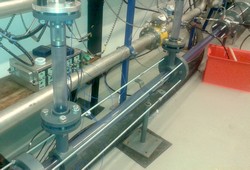Innovative approaches and solutions to reduce noise pollution
Funded by the EU, the project FLOWAIRS(opens in new window) (Silent air flows in transport, buildings and power generation) has supported moves to advance knowledge in duct acoustics and develop innovative solutions to mitigate the harmful effects of noise exposure. The primary area of focus was European-wide training in the study of generation, propagation and reduction of sound in flow ducts for transport, buildings and power generation. The first step in this direction was to mobilise a collaborative research network to carry out various training activities. FLOWAIRS gathered a network of European and Egyptian specialists in aero- and vibroacoustics. Representing the academic and private sectors, the partners collaborated to define the training programme and train a new generation of researchers. Altogether, 14 early-stage researchers and 4 postdoctoral fellows took part in research activities related to three main areas of study. The first, noise production mechanisms and noise propagation, involved at least six fellows. The work of two fellows has implications for advances in diagnostics and blade design. A major industrial partner has supported work on numerical acoustic prediction tools and a code related to waves and flow effects. The second area of study was devoted to development of innovative noise reduction techniques. Fellows undertook work on metamaterials and interference effects, a new compact muffler, and work on resonators and flow-noise coupling. Researchers also made advances in the third area of study, the improvement of prediction methodologies. Work in this regard included high-fidelity numerical flow simulation methods to study sound generation from obstacles in ducts, with one fellow simulating the flow-acoustic coupling of in-duct orifices. Other research involved calculations and experiments that allow analysis of the different configurations and phenomena responsible for noise generation. In addition to the training through research, fellows gained insights into the complexity of industrial issues, trained in an extra-academic framework through secondments, and took part in compulsory courses and workshops. FLOWAIRS has contributed to a new generation and network of researchers advancing the state of the art in noise control. Supporting innovative solutions for reduced noise pollution will strengthen Europe's position in the industry and, most importantly, ultimately improve citizens' well-being and health.



